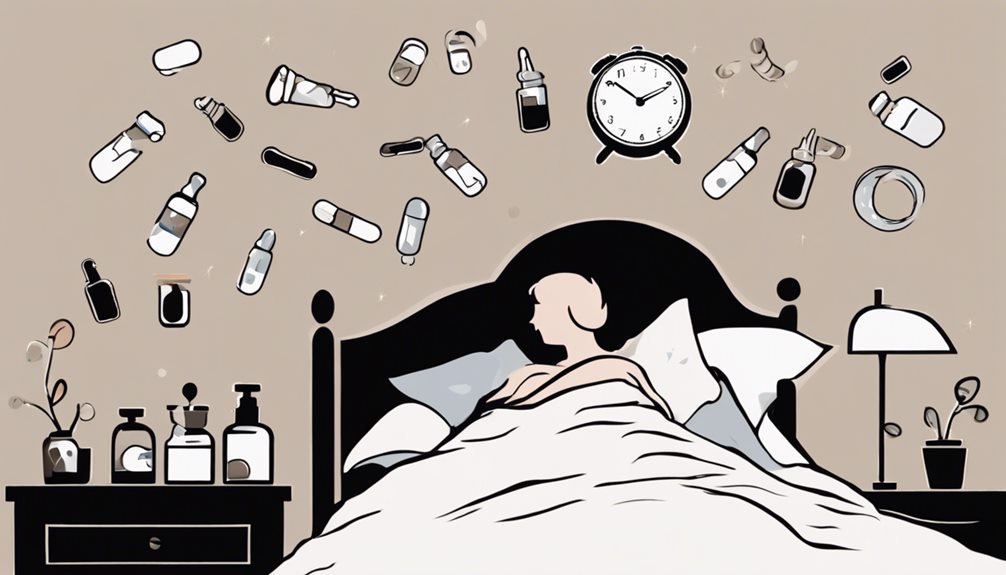Imagine your body is a garden, and sleep is the nourishing rain that helps it thrive. Just like a garden needs water to flourish, your body requires quality sleep to aid in cancer recovery. The impact of sleep on your body's healing journey is profound, influencing various aspects of your physical and emotional well-being. As you navigate through the complexities of cancer recovery, understanding the critical role that sleep plays in this process can offer valuable insights into optimizing your recovery outcomes.
Key Takeaways
- Quality sleep aids immune response during cancer recovery.
- Proper rest supports cell repair and rebuilding.
- Hormonal balance crucial for healthy sleep patterns.
- Sleep deprivation weakens immune function and impacts recovery.
- Adequate sleep duration enhances treatment outcomes.
Sleep Quality and Immune Response
Improving your sleep quality can have a significant impact on your immune response during cancer recovery. During different sleep stages, your body goes through essential processes that influence your immune system's ability to fight off illnesses and support your recovery journey.
One crucial stage is REM sleep, where your brain is active, and your body undergoes restoration processes. During REM sleep, your inflammation levels decrease, allowing your immune system to focus on repairing and rebuilding cells damaged during cancer treatments.
Hormonal Balance and Sleep Patterns
Ensuring a balanced hormonal profile is crucial for maintaining healthy sleep patterns, especially during the challenging phase of cancer recovery. Hormonal disruptions can lead to sleep disturbances, impacting sleep quality significantly. Stress hormones, like cortisol, play a vital role in regulating the sleep-wake cycle.
When hormonal balance is disrupted due to the stress of cancer treatment, it can result in difficulties falling asleep or staying asleep, leading to sleep deprivation.
During cancer recovery, the body is already under immense stress, and hormonal imbalances can exacerbate sleep issues. Cortisol levels, for instance, tend to peak in the early morning, helping you wake up feeling refreshed. However, when these levels are dysregulated, it can disrupt your sleep patterns, affecting your overall well-being.
To combat hormonal disruptions and promote better sleep, it's essential to focus on stress management techniques, such as mindfulness, relaxation exercises, and maintaining a consistent sleep schedule. By addressing hormonal imbalances and prioritizing healthy sleep patterns, you can support your body's recovery process and overall health.
Impact of Sleep Deprivation on Recovery

Struggling to get adequate sleep during cancer recovery can have a profound impact on your overall healing journey. Sleep deprivation can significantly hinder your recovery progress and diminish treatment effectiveness. Here's how:
- Impaired Immune Function: Lack of sleep weakens your immune system, making it harder for your body to fight off cancer cells and recover from treatments effectively.
- Increased Inflammation: Sleep deprivation can lead to heightened inflammation levels in your body, which can interfere with the healing process and potentially worsen side effects of cancer treatments.
- Emotional Well-being: Poor sleep can exacerbate feelings of anxiety, depression, and overall emotional distress, which can further impede your recovery progress and affect how well you respond to cancer treatments.
Prioritizing good sleep hygiene and seeking support for sleep-related issues are crucial steps in enhancing your recovery journey. Remember, adequate rest isn't a luxury but a vital component in your fight against cancer.
Circadian Rhythm and Cancer Treatment
How does your body's natural circadian rhythm influence the effectiveness of cancer treatments?
Your circadian rhythm, the internal clock that regulates your sleep-wake cycle, plays a crucial role in how your body responds to cancer therapies. Research suggests that aligning cancer treatments with your body's natural rhythm can enhance their efficacy. Exposure to light during the day helps regulate your circadian rhythm, influencing the timing of when your body is most responsive to treatment.
Meal timing is another factor to consider, as eating at consistent times can help synchronize your body's internal clock and optimize the effects of cancer therapies.
Melatonin Production and Healing

To optimize your body's healing process during cancer treatment, understanding the role of melatonin production is crucial. Melatonin, often referred to as the "sleep hormone," is naturally produced by the pineal gland in response to darkness, helping regulate your sleep-wake cycle. Here's how melatonin impacts your healing:
- Regulation of Circadian Rhythms: Melatonin plays a significant role in synchronizing your body's internal clock, which is essential for promoting restful sleep and supporting your immune system during cancer treatment.
- Antioxidant Properties: Melatonin acts as a powerful antioxidant, protecting your cells from damage caused by free radicals, potentially aiding in reducing inflammation and supporting overall healing processes.
- Melatonin Supplementation: In some cases, melatonin supplementation may be recommended to help improve sleep quality, reduce treatment-related side effects, and enhance the body's natural healing mechanisms.
Understanding the healing properties of melatonin and considering supplementation under medical guidance can potentially support your body's recovery journey during cancer treatment.
Sleep Hygiene Practices for Patients
Ensuring proper sleep hygiene practices is vital for patients undergoing cancer treatment. Relaxation techniques play a crucial role in helping you unwind before bedtime. Consider incorporating practices like deep breathing exercises, progressive muscle relaxation, or meditation to calm your mind and body.
Establishing sleep rituals can also enhance your sleep quality. Create a soothing bedtime routine by dimming lights, avoiding screens, and engaging in activities like reading or listening to calming music. Consistency is key in training your body to recognize when it's time to wind down for the night.
Additionally, maintaining a comfortable sleep environment is essential. Keep your bedroom cool, quiet, and dark to promote restful sleep. Invest in a supportive mattress and pillows to ensure proper body alignment.
Sleep Disturbances and Treatment Side Effects

When undergoing cancer treatment, sleep disturbances and treatment side effects can significantly impact your quality of rest. It's essential to address these challenges to ensure you receive the rest your body needs to heal. Here are some key points to consider:
- Pain Management: Cancer treatment can often result in pain that disrupts your ability to sleep. Ensuring you have an effective pain management plan in place can help alleviate discomfort and promote better sleep.
- Stress Reduction: The emotional and physical stress of cancer treatment can lead to heightened anxiety and restlessness, making it difficult to fall and stay asleep. Implementing stress reduction techniques such as mindfulness, meditation, or gentle exercise can help calm your mind and body for a more restful night.
- Medication Side Effects: Some cancer treatments come with side effects like nausea, hot flashes, or changes in appetite that can interfere with your sleep. Working closely with your healthcare team to manage these side effects can improve your overall sleep quality.
Psychological Effects of Poor Sleep
As you navigate the challenges of poor sleep during your cancer recovery journey, it's crucial to recognize the significant psychological effects it can have on your well-being. Sleep patterns play a vital role in emotional well-being, impacting your mood, stress levels, and overall mental health. When sleep quality is compromised, cognitive function may decline, affecting your ability to concentrate, remember details, and make decisions effectively.
Research shows that inadequate sleep can lead to heightened feelings of anxiety, irritability, and sadness, amplifying the emotional toll of battling cancer. Poor sleep can also exacerbate feelings of loneliness and isolation, making it harder to cope with the demands of treatment and recovery.
Understanding the intricate relationship between sleep and psychological well-being is essential in optimizing your cancer recovery journey. By prioritizing healthy sleep habits and seeking support to improve your sleep quality, you can positively impact your emotional resilience and cognitive function, ultimately enhancing your overall well-being during this challenging time.
Sleep Duration and Treatment Outcomes

Understanding the impact of sleep duration on treatment outcomes is crucial in optimizing your cancer recovery journey. The relationship between sleep and your treatment results is intricate, with sleep duration affecting both nutrition impact and exercise correlation. Here's what you need to know:
- Sleep duration and nutrition impact: Adequate sleep duration plays a vital role in maintaining a healthy diet. Lack of sleep can disrupt your hunger hormones, leading to poor food choices and potential weight gain, impacting your overall nutrition during treatment.
- Sleep quality and exercise correlation: Quality sleep directly influences your energy levels and physical performance during exercise. Poor sleep can result in fatigue, reducing your motivation to engage in physical activities crucial for your recovery.
- Finding the balance: Strive for a sufficient sleep duration to support your nutritional needs and enhance your exercise capacity. Prioritizing restorative sleep can positively impact your treatment outcomes and overall well-being on your cancer recovery journey.
Benefits of Deep Restorative Sleep
To truly grasp the importance of sleep in your cancer recovery journey, delving into the profound benefits of deep restorative sleep is essential.
Deep restorative sleep occurs during the non-REM stages of sleep, where your body undergoes crucial repair and rejuvenation processes. During these stages, tissues are repaired, energy is restored, and essential hormones are released to support your overall well-being and immune function. Understanding the intricacies of sleep architecture is vital in comprehending how deep restorative sleep plays a pivotal role in your recovery.
The different sleep stages, including light sleep, deep sleep, and REM sleep, each contribute uniquely to your health.
Deep restorative sleep, characterized by slow brain waves and relaxed muscles, is particularly beneficial for cancer patients as it promotes healing and strengthens the immune system. By prioritizing deep restorative sleep, you provide your body with the optimal conditions for combating cancer and enhancing your overall quality of life.
Embracing the benefits of deep restorative sleep can be a powerful ally in your journey towards recovery.
Sleep Aids and Complementary Therapies

Exploring supportive measures for optimizing your sleep quality and overall well-being can significantly enhance your cancer recovery journey. When looking into sleep aids and complementary therapies, consider incorporating the following:
- Meditation Techniques: Engaging in mindfulness practices before bedtime can help calm your mind and promote relaxation, making it easier to fall asleep. Techniques such as deep breathing, body scans, and visualization can aid in reducing stress and improving sleep quality.
- Herbal Remedies: Certain herbs like valerian root, chamomile, and lavender have been traditionally used to promote relaxation and improve sleep. Herbal teas or supplements containing these ingredients may help in inducing peaceful sleep without the side effects of conventional sleep aids.
- Acupuncture: This ancient Chinese practice involves inserting thin needles into specific points on the body to stimulate energy flow. Acupuncture has shown promise in improving sleep quality and addressing insomnia, providing a natural approach to enhancing your restorative rest.
Creating a Supportive Sleep Environment
Creating an optimal sleep environment is crucial for supporting your body's natural healing processes during cancer recovery. Pay attention to your sleep environment design and patient comfort to optimize your healing atmosphere. Start by ensuring your bedroom is a peaceful sanctuary dedicated to rest.
Keep the room dark, cool, and free from distractions. Consider using blackout curtains, earplugs, or white noise machines to create a soothing ambiance. Invest in a comfortable mattress and pillows that support your body and alleviate any pain or discomfort. Personalize your sleep space with calming colors, cozy bedding, and items that bring you joy.
Maintain good air quality by keeping the room well-ventilated and at a comfortable temperature. Limit exposure to electronic devices before bedtime to promote relaxation. Establish a bedtime routine that signals to your body it's time to unwind and prepare for sleep. By prioritizing your sleep environment and focusing on patient comfort, you can enhance the quality of your rest and support your body's healing journey during cancer recovery.
Frequently Asked Questions
Can Napping During the Day Improve Cancer Recovery Outcomes?
Napping during the day can boost your energy and improve your mood. It's a great way to recharge and stay productive. Make sure your daytime napping doesn't interfere with your nighttime sleep.
Good sleep hygiene is crucial for overall health. So, if you need a quick nap, go for it, but keep it short to avoid disrupting your regular sleep patterns. It's all about finding that balance for optimal well-being.
How Does Irregular Work Shifts Affect Circadian Rhythms During Treatment?
Imagine your body as a finely tuned orchestra, each note essential for harmony. When shift work disrupts your circadian rhythms, it's like a conductor missing cues, leading to discord. These irregular schedules can throw off your body's natural rhythm, impacting your health and well-being.
Studies show that circadian disruption from shift work may affect cancer treatment outcomes, emphasizing the importance of maintaining a consistent schedule for optimal recovery.
Are There Any Specific Foods That Can Enhance Melatonin Production?
You can enhance melatonin production through specific dietary supplements and light therapy.
Foods like cherries, grapes, and tomatoes contain melatonin-boosting properties. Additionally, consider incorporating melatonin-rich supplements like valerian root or magnesium.
Light therapy, exposing yourself to natural sunlight during the day and minimizing artificial light at night, can also improve melatonin levels.
These strategies may help regulate your sleep-wake cycle and support better overall sleep quality.
Can Mindfulness Meditation Help Alleviate Sleep Disturbances in Patients?
Imagine a garden where mindfulness meditation acts as the sunlight, gently nurturing the soil of your mind. In this sanctuary, sleep disturbances with roots in cancer recovery find solace. By tending to your mental garden, you can cultivate a peaceful space for rest.
Mindfulness meditation aids in aligning your circadian rhythms, reducing irregular shifts. Embrace this practice to enhance melatonin production, allowing your dreams to flourish and nurturing your psychological well-being.
Is There a Connection Between Dream Content and Psychological Well-Being During Recovery?
Exploring dream analysis reveals a profound link between dream content and emotional healing during recovery. Understanding these dreams can provide valuable insights into your psychological well-being.
Research suggests that addressing and processing dream themes may contribute to improved mental health and overall emotional resilience. By delving into the realm of dreams, you may uncover hidden aspects of your psyche that could aid in your journey towards holistic healing and well-being.
Conclusion
So, there you have it – sleep truly is a secret weapon in your cancer recovery arsenal. By prioritizing quality rest, you can boost your immune system, balance hormones, and support your body's healing processes. Remember, ZZZs are not just for catching up on dreams, they're crucial for your overall well-being. So, make sure to create a cozy sleep environment, practice good sleep hygiene, and let those sweet dreams work their magic as you journey towards recovery.





